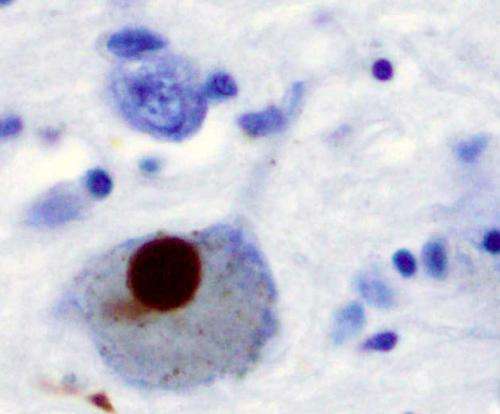Study reports repair of mitochondrial recycling defect linked to Parkinson's disease

Treating mice that have a Parkinson's disease-causing mutation with a small molecule compound restores the removal of damaged mitochondria from their brain cells, shows a study published today in eLife.
The findings may help explain what goes wrong in dopamine-producing brain cells in people with mutations that cause Parkinson's disease.
Parkinson's disease is caused by the progressive loss of brain cells that produce dopamine. This causes the hallmark symptoms of the disease, including tremors, rigid movements, sleep problems and dementia.
"Scientists believe the death of these cells in people with Parkinson's disease is caused, in part, by the failure of a quality control mechanism that removes damaged energy-producing structures in the cells called mitochondria," explains first author Francois Singh, Postdoctoral Research Assistant at the Medical Research Council Protein Phosphorylation and Ubiquitylation Unit (MRC PPU), University of Dundee, Scotland, UK. "This failure to recycle damaged mitochondria is detrimental to the health of brain cells."
To learn more, Singh and colleagues teamed up with scientists from the Division of Signal Transduction Therapy, a consortium of academia and pharmaceutical companies. Together they used cutting-edge techniques to observe mitochondria recycling in the brains of mice that have the most common Parkinson's disease-causing mutation in a gene called LRRK2.
Their experiments showed that damaged mitochondria are not efficiently removed in the animals' dopamine-producing brain cells, and that damaged components in other types of brain cells are recycled. This may explain why dopamine-producing brain cells are selectively lost in Parkinson's disease and why the symptoms are all linked to a lack of dopamine.
The mutation in the LRRK2 gene results in the production of a hyperactive version of the protein. Given this, the team treated the mice with a small molecule that inhibits the hyperactive protein and found that it restored mitochondria recycling in the animals' dopamine-producing brain cells.
The authors say these results are an exciting step forward in the quest to understand mechanisms responsible for this currently incurable disease. These results should help drive and focus research in this area.
"Not only have we discovered new biology, but we have also shown that an LRRK2 inhibitor can rescue a mitochondrial defect related to Parkinson's disease," concludes senior author Ian Ganley, MRC Investigator and Scientific Programme Leader at MRC PPU, University of Dundee. "These findings highlight the significant benefit of academic-industrial collaborations that will hopefully accelerate the development of new treatments for Parkinson's disease."
More information: Francois Singh et al, Pharmacological rescue of impaired mitophagy in Parkinson's disease-related LRRK2 G2019S knock-in mice, eLife (2021). DOI: 10.7554/eLife.67604




















